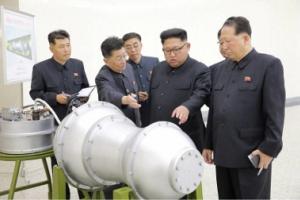A Progressive Victory over the Coronavirus
Foreign Policy in Focus
Testing and tracing were the key to slowing the spread of coronavirus.
 The war hawks are wrong when they say that past negotiations, like the 1994 Agreed Framework, didn’t make a difference. August 2017 was a reminder of the scariest, and riskiest, days of the Cold War. All month long, Donald Trump and Kim Jong-un engaged in a bitter war of words that escalated into tit-for-tat displays of military might and ended with mutual threats of mass destruction.
The war hawks are wrong when they say that past negotiations, like the 1994 Agreed Framework, didn’t make a difference. August 2017 was a reminder of the scariest, and riskiest, days of the Cold War. All month long, Donald Trump and Kim Jong-un engaged in a bitter war of words that escalated into tit-for-tat displays of military might and ended with mutual threats of mass destruction.
Spread the word